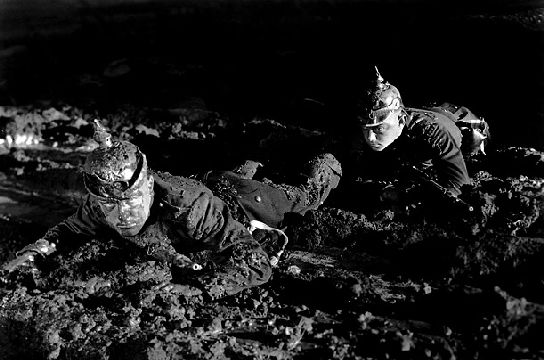All Quiet on the Western Front (1930) 
“At last….the motion picture!”

Director: Lewis Milestone
Cast: Lew Ayres, Louis Wolheim, John Wray
Synopsis: A young soldier faces profound disillusionment in the soul-destroying horror of World War I.
In a shrinking world such as the one in which we live, in a world in which the American movie industry takes foreign works, mangles them into something they believe is acceptable to the lowest denominator necessary to ensure a profitable return on their investment, and then shakes its collective head in bemusement when their Frankenstein’s monster of a movie bombs, it is something of a bittersweet experience to be taken back to a time when Hollywood was still capable of treating original works with the respect they deserved. Sure, they made plenty of duds back then, but when they got their hands on something special they generally lavished a care and attention on its transformation into film that would give today’s Hollywood accountants conniptions. We all know the accountants control the American movie industry, that they must be satisfied that the product in which they invest will appeal to the widest possible social spectrum (i.e. those human monkeys capering and swinging on the bottom two rungs of the anthropological ladder). We know it, and we accept it without really giving it much thought, and then we watch a film made when our grandparents were young and can only wonder at the number of potential classics that have — and will — never be made because they don’t possess the necessary ‘universal’ appeal.
All Quiet on the Western Front was made between the two world wars, at a time when the world couldn’t really imagine a war greater than the one that had ended just twelve years before. It’s perhaps unsurprising then that it treats its subject with a portentousness that is lacking from most war movies. These days, except when a film like Saving Private Ryan comes along, we tend to be desensitised to the horrors of war, and the (near obsolete) genre’s role has changed dramatically. No longer the carrier of meaningful messages, it has largely been relegated to the status of action flick: explosions and guns and a wisecracking hero.
A 22-year-old Lew Ayres plays Paul Baumer, one of a group of German schoolboys inspired by the nationalistic grandstanding of a teacher (Arnold Lucy — Dr Jekyll and Mr Hyde) into enlisting in the army at the outset of the Great War. Filled with patriotic fervour and visions of heroism, the boys soon discover the realities of war are nothing like the noble images spoon-fed them by the teacher. The war in which they find themselves is about abject terror, hunger, loneliness, about torn and amputated limbs, about the death of countless comrades for the sake of advancing a few yards across a muddy field. Inevitably, their numbers dwindle as the war grinds on, marked for a brief section by the passing on of a pair of fine boots. Baumer survives, thanks largely to the paternal tutelage of Katcinsky (Louis Wolheim – Dr Jekyll and Mr Hyde (1920), in his career-defining role just one year before his death from stomach cancer), a pugnacious veteran with a nose for finding food in the most inhospitable places (his hijacking of a pig is one of the films few humorous moments). At the age of nineteen or so, in the last year of the war, he has become a seasoned veteran, irreversibly altered by the war and plagued by feelings of alienation from his family and friends at home.
Baumer is one of the tragic figures of cinema, doomed to his fate the moment he marches off to war. In his first starring role, Ayres acquits himself well, although his acting, which would have been perfectly acceptable at the time, comes across as stagey today. The fact that this is a story about German boys is also important, giving the film added power to shock. Too often, the enemy is portrayed as an homogeneous foe in movies, and it is refreshing that the enemy, for once, has a human face (imagine a sympathetic US film today about those gooks in black pyjamas!), and that the audience is forced to confront the fact that the ‘enemy’ is as horrified and terrified by the war as they are.
Arthur Edeson’s cinematography is another remarkable facet of this film. With the advent of sound, movies took a huge step backwards in terms of creativity. Cameras were entombed in soundproof booths so that the multi-directional microphones wouldn’t pick up their noise. This thankfully brief development stifled the director, turning the cinema into a static medium (the ‘early-sound film-making’ scene in Singing in the Rain, although played for laughs, pretty much sums up the problems faced by directors at the time) yet Edeson’s camera is constantly on the move; the battle scenes are often reminiscent of Griffith at his flamboyant peak. Russian-born director Lewis Milestone, who served in the signal corps during the war, is clearly influenced by Eisenstein (this is perhaps never clearer than during the German teacher’s warmongering speech that propels his students toward their deaths) and it is perhaps this influence that makes All Quiet on the Western Front so unlike any other contemporary Hollywood film. Milestone is unflinching in his depiction of the violence and futility of war, and has crafted a classic piece of pacifist work that is as fresh and thought-provoking today as it was seventy-five years ago.
(Reviewed 3rd March 2010)
httpv://www.youtube.com/watch?v=aiObc2XmVqw
